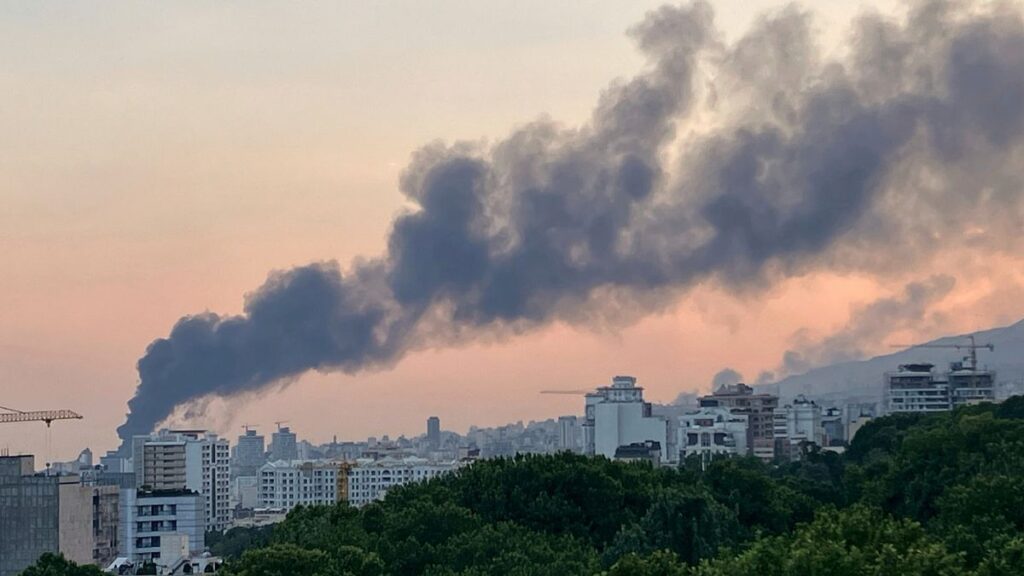Divisions over the justification for Israel’s attack on Iran last Friday are set to surface among ambassadors in Brussels on Thursday, stymying EU attempts at finding a common response to the crisis, according to sources Euronews has spoken to.
“It’s definitely an issue that is being discussed – what is the extent to which this right of self-defence is acceptable,” one source said.
The EU issued a statement on Saturday calling “on all sides to abide by international law, show restraint and refrain from taking further steps which could lead to serious consequences such as potential radioactive release”.
Sources close to the discussion say a “major” part of the deliberations among member states was whether the EU should state “Israel has a right to defend itself” in the context of its attacks against Iran.
Around 15 member states including Austria, Czechia, France, Germany, Hungary, Italy and the Netherlands wanted to add the line but it was not agreed unanimously.
Several other countries felt there wasn’t sufficient evidence that Israel has the right under international law to launch its offensive against Iran.
Under international law, and the UN Charter, a state may exercise its right to self-defence in case of an armed attack or imminent attack. Any necessary action should also be proportionate.
No consensus on attacks being justified through right of defence
Israel says its series of strikes are pre-emptive moves to stop Iran from obtaining nuclear weapons.
The issue is set to be discussed by ambassadors in Brussels on Thursday and is an agenda item for next week’s EU summit of heads of state and government. Draft conclusions for that summit seen by Euronews currently contain no wording in respect of the EU Council’s position on the Israel-Iran conflict.
Meanwhile, EU sources told Euronews they were “surprised” by a tweet from the Commission President announcing implicit support for Israel’s attacks against Tehran.
The message from Ursula von der Leyen went further than the agreed statement of the European Council, which is the arm of the EU with the authority to conduct foreign policy.
Ursula von der Leyen tweeted “Spoke with President Herzog concerning the escalating situation in the Middle East. I reiterated Israel’s right to defend itself and protect its people”.
“There was no consensus on saying Israel has a right to defend itself but Von der Leyen said it anyway,” another diplomatic source told Euronews.
“She saw the agreed language and then made her own statement,” they said.
“It was disheartening to be honest,” said the diplomat.
“These countries like Iran – as bad as they are don’t simply submit when they’re attacked like this, and what comes next will be so much worse even if there is regime change in Iran,” said this source, adding: “And then when two or three million Iranians turn up on Europe’s door they’ll say we can’t deal with this migration crisis.”
“Member states which are critical of Israel said they thought Israeli attacks on Iran were irresponsible, but a large group is on board with von der Leyen’s statement,” said another diplomat.
“We would say that’s a question for legal scholars – there is no judgement on that yet,” the diplomat responded, when asked if their government believed the war against Iran to be within the provisions of international law.
Former International Atomic Energy Agency (IAEA) chief Mohammad El Baradei claimed in a post on X that Israeli “suspicion does not constitute an imminent threat”, and that Israel’s attack on nuclear facilities was illegal under international law.
“The president has made her position clear, her position has already been taken quite clearly by the G7 leaders statement on the developments in the region,” von der Leyen’s spokesperson said when asked about the difference between the official statement of the EU and that of the Commission president.
“She also communicated on social media stressing the fact that Israel has the right to defend itself and Iran is the main source of tension in the region,” said Stefan de Keersmaecker on Wednesday.
The EU regards Iran as major destabilising influence in the European continent through its military support of Russia.
Iran has been supplying Shahed drones to Russia since the start of Russia’s full scale invasion of Ukraine in 2022, according to the Ukrainian army.
Meanwhile the EU’s foreign policy chief Kaja Kallas has since reiterated the official EU position for a diplomatic resolution to the Israel-Iran war.
And again called on all sides to “abide by international law, and de-escalate the situation”.
She tweeted on Wednesday that “Israel has the right to defend itself in line with international law.”
Read the full article here
